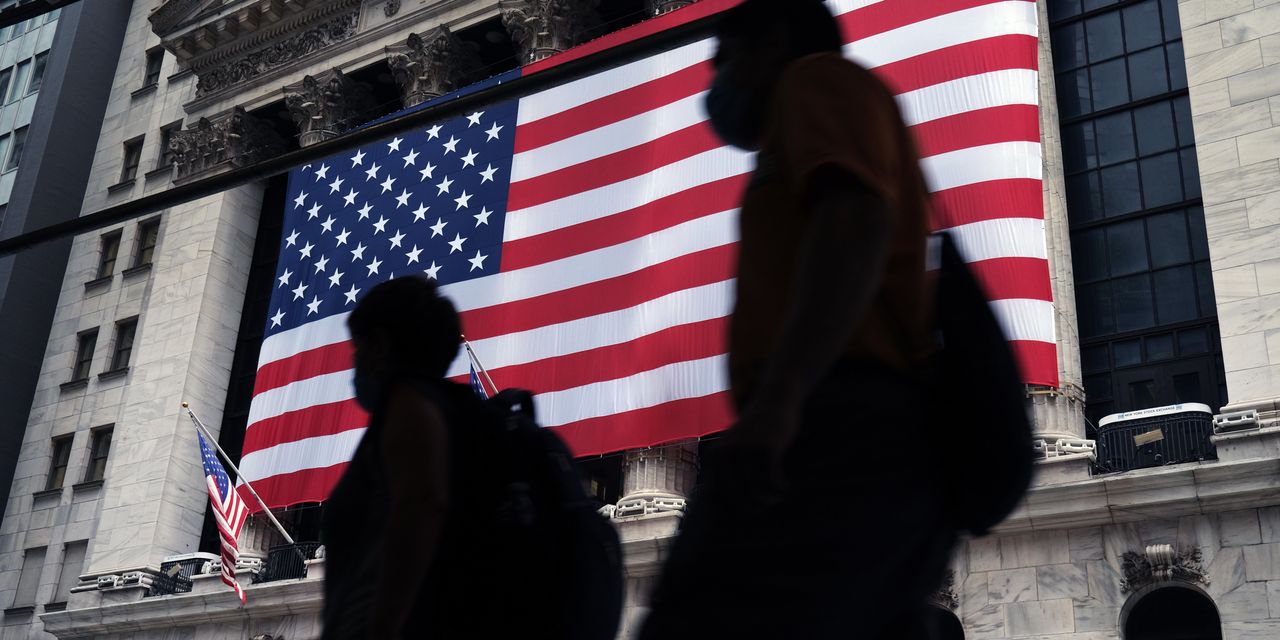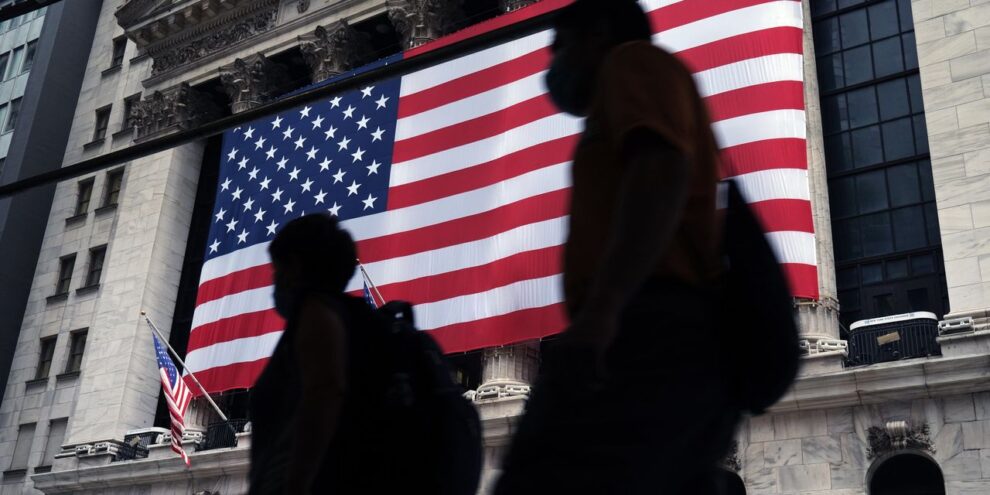
U.S. stock benchmarks closed mostly higher Friday, after paring earlier losses, despite a top White House economic adviser saying talks on another financial-aid package weren’t seeing much traction in Congress, stoking investor fears that any plan would not be implemented before Election Day.
What did major benchmarks do?
The Dow Jones Industrial Average DJIA, -0.09% lost 28.09 points, or 0.1%, to close at 28,335.57, weighed down by a 10.6% drop in shares of Intel Corporation. The S&P 500 SPX, +0.34% rose 11.90 points, or 0.3%, to end at 3,465.39. The Nasdaq Composite Index COMP, +0.36% gained 42.28 points, or 0.4%, finishing at 11,548.28.
The Dow on Thursday rose 152.84 points, or 0.5%, to close at 28,363.66, while the S&P 500 gained 17.93 points, or 0.5%, to finish at 3,453.49. The Nasdaq Composite ended at 11,506.01, up 21.31 points, or 0.2%.
For the week, the Dow lost 1%, the S&P 500 shed 0.5%, and the Nasdaq dropped 1.1%. The small-cap Russell 2000 RUT, +0.62% gained 0.4% during that time, continuing a recent trend of outperforming the larger-stock indexes.
What drove the market?
The White House and House Speaker Nancy Pelosi remained upbeat publicly about the prospects for another fiscal stimulus package, even as time almost has run out for relief measures to be turned into law before the elections on Nov. 3.
Larry Kudlow, director of the White House’s National Economic Council, however, threw cold water on those hoping for a near-term aid spending package to materialize from negotiations.
“It would be very difficult, even if you had a deal in the next few days, Kudlow said in an interview with Bloomberg Television on Friday. “The ball’s not moving much right now,” he said.
“You’ve got to go through the committee print, and then you’ve got to have votes in the House and the Senate, so it’s not going to be easy,” he told Bloomberg.
The apparent change makes it doubtful that a deal can be struck soon that would pass muster with Senate Republicans, who have balked at spending plans of around $2 trillion. Senate Majority Leader Mitch McConnell, R-Ky., on Thursday also refused to commit to a pre-election vote on an aid package.
“We’re not going to get a deal until after the election,” said Andrew Smith, chief investment strategist at Dallas-based Delos Capital Advisors . “It just seems that it’s a kick-the-can kind of situation and we’re not optimistic.”
Like many analysts, Smith thinks markets are content to wait for a bigger stimulus package in January or February. Getting a package now would “speed things up,” and should be viewed as a “social responsibility” for those people struggling in the economic downturn, he said in an interview, but he thinks the recovery will remain intact if a few months elapse without additional aid.
“We’re seeing these really great signs of sectors tied to the recovery outperform the headline index,” Smith said, citing financials KBWB, +0.72% as one example. “Adding exposure to those cyclicals will bode well into Q1. But I’m convinced that the market could potentially move a little lower. The S&P 500 has made a series of lower lows over the last few days. From these levels, a 5% pullback would not be uncommon. That kind of a drawdown would be something to take advantage of. We don’t see another all-time high until after the election.”
Meanwhile, a second and final head-to-head debate between Democratic challenger Joe Biden and President Donald Trump on Thursday night had little effect on markets, with the incumbent also highlighting challenges in getting a fiscal aid bill going.
Biden continued to lead Trump in the polls, but has seen his advantage narrow somewhat in general election polls from RealClearPolitics. His advantage in polls tracking so-called battleground states, which could ultimately decide the election outcome, has edged up to 5.1 percentage points from 4.9.
Read: Trump, Biden attack each other over virus, stock market and economy in final debate
“The market’s verdict on the U.S. debate is that it doesn’t alter the outlook significantly and, as such, doesn’t justify a collapse in risk sentiment or anything more serious,” said Kit Juckes, macro strategist at Société Générale, in a note.
Positive news on the COVID-19 treatment front may have provided some support for stocks. The Food and Drug Administration on Thursday approved Gilead Sciences Inc.’s GILD, +0.19% Veklury for patients who had been hospitalized with COVID-19. The drug, until now called remdesivir, is the first COVID-19 therapy to receive full FDA approval during the pandemic though the World Health Organization says the drug has a limited effect on patients chances of survival. Gilead shares rose 0.2%.
Meanwhile, shares of Intel Corp. INTC fell 10.6% Friday after the company late Thursday said revenue sank more than expected in the third quarter as sales of server chips suffered.
In U.S. economic data, the IHS Markit PMI indexes for both the service and manufacturing sides of the economy rose in October, showing the fastest rate of expansion in 20 months, but companies acted cautiously with coronavirus still spreading and the presidential election potentially trigging a major shift in business rules.
Which companies were in focus?
- American Express Co. AXP, -3.63% shares fell 3.6% after the credit card and travel services company reported a third-quarter profit that disappointed compared with expectations, while revenue topped forecasts.
- Shares of Mattel Inc. MAT, +9.55% surged 9.6% after its third-quarter earnings topped estimates and the toy company forecast a strong holiday season.
- Bloomin’ Brands Inc. BLMN, -8.29% shares sank 8.3% after the restaurant company reported third-quarter losses that were narrower than expected. Net loss totaled $17.6 million, or 20 cents per share, after net income of $9.2 million, or 11 cents per share, last year.
- Shares of Hubbell Inc. HUBB, +2.49% rallied 2.5%, after the maker of electrical and utility products raised its dividend by 7.6% and approved a new $300 million stock buyback program.
What did other markets do?
The yield on the 10-year Treasury note TMUBMUSD10Y, 0.842% edged back 0.7 basis point to 0.840%. Yields and bond prices move in opposite directions.
In global equities, the Shanghai Composite SHCOMP, -1.04% fell 1%, while Hong Kong’s Hang Seng Index HSI, +0.53% rose 0.5% and Japan’s Nikkei 225 NIK, +0.18% gained 0.2%. European stocks finished the week on a strong note, with the Stoxx 600 Europe Index SXXP, +0.61% closing 0.6% higher, while London’s FTSE 100 UKX, +1.29% ended with a 1.3% advance.
Oil futures closed lower, with the U.S. crude benchmark CL.1, -2.11% off 1.9% at $39.85 a barrel on the New York Mercantile Exchange. Gold futures GOLD, -0.29% rose 60 cents, or 0.03%, to settle at $1,905.20 an ounce.
The ICE U.S. Dollar Index DXY, -0.22%, a measure of the currency against a basket of six major rivals, was down 0.2%.
Read next: Will a capital-gains tax increase squelch stock gains?











Add Comment